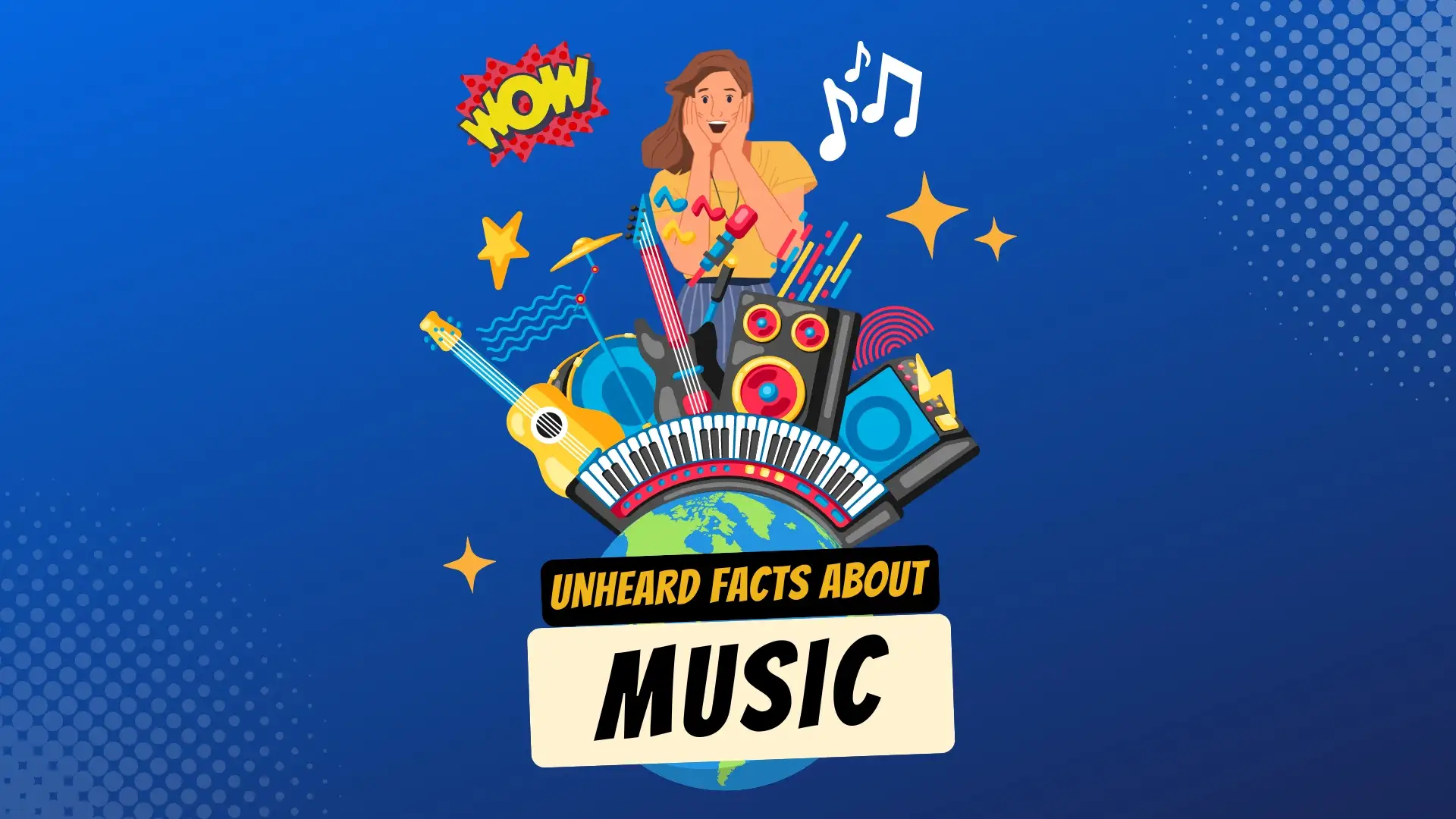- Amazing Unheard Facts about Music
- None of the members of the Beatles possessed the ability to read or write music
- Do you know that there is an album recorded in space?
- The Mozart Effect
- A Melodic Masterpiece for Tranquility
- Music keeps your heart healthy
- Some People don’t feel Music
- Music has Memory-Recall power after Brain Injuries
- Is the perception affected by Music?
- Babies can hear music inside the womb
- Musicians have a short lifespan
- Group Singing improves mood and reduces stress
- Conclusion
- FAQs
Amazing Unheard Facts about Music
Music is a timeless form of expression that has fascinated people from all walks of life for centuries and holds a place in our hearts and memories. Various facts about music remain hidden. It is just not a collection of notes and melodies, it speaks directly to the soul.
Its impact goes far beyond just entertainment, touching every aspect of our lives, right from emotional well-being to cultural identity and beyond. Apart from this, there are countless weird facts about music waiting to be uncovered. In this blog, we will explore some of the little-known facts about music. Let’s begin!
We are listing here some mind-blowing facts about music for you:
None of the members of the Beatles possessed the ability to read or write music
Paul McCartney in an interview in 2018 confessed that neither he nor his bandmates including John Lennon, Ringo Starr, and George Harrison could read or write music. McCartney mentioned that their music simply flowed naturally without being notated. It’s fascinating to think about what creations they might have produced with musical education!

The best music is essentially there to provide you something to face the world with.” — Bruce Springsteen
Do you know that there is an album recorded in space?
In 2015 Chris Hadfield, an astronaut released his album while he was, in orbit in space. He is known as the first Canadian to travel to space and became famous for his cover of David Bowies “Space Oddity.” Throughout his 144-day mission at the International Space Station Hadfield wrote 11 songs for his album called Space Sessions; Songs, for a Tin Can.
The Mozart Effect
We have all heard about the Mozart effect, listening to Mozart’s music can enhance cognitive function. Studies have proved that music can stimulate the brain, affecting everything from memory to emotions. There is no such proof that suggests listening to Mozart enhances children’s cognitive skills.
The concept originated from a study in 1993, where it was discovered that university students who listened to Mozart’s Sonata, for Two Pianos, in D Major(K 448) demonstrated progress in spatial reasoning during a test.
Mozart’s music has established a benchmark for his compositions, orchestration, and arrangement shaping the work of composers and for genres such as sonatas, symphonies, and operas.
A Melodic Masterpiece for Tranquility
We all have those go-to songs that help us relax. Did you know science considers a tune to be a stress buster? A group of neuroscientists in the UK conducted a study and found that “Weightless” by Marconi Union and Lyz Cooper is the most calming song ever. When played for 40 women solving puzzles this specific track proved to be the most effective at inducing relaxation.
This 8-minute 8-second masterpiece brought about a 65% decrease in anxiety levels and a 35% reduction in physiological resting rates. Additionally, Weightless helped in lowering blood pressure, heart rate, and breathing speed compared to any other tune, it also surpassed the relaxing effects of a massage, stroll, or a soothing cup of tea. It is advised not to listen to this song while driving due to its nature.
Music keeps your heart healthy
Yes, music helps to deliver amazing benefits to cardio health. Experts found that enjoying music regardless of the genre can have an impact on your cardiovascular health. Regardless of the genre, experts have discovered that it can have a great impact on your heart health.
Listening to music while you are walking or running can synchronise your breathing and heart rate. It’s a trick many runners use to stay in tune with their bodies and maintain their well-being automatically.
Some People don’t feel Music
Wait what? Yes, some people don’t feel anything when they hear music. A recent study carried out at the University of Barcelona stated that there are few individuals who do not experience pleasure from music. During the study, researchers observed participant’s reactions to music as a measure of response. Surprisingly 5% of the participants showed no reaction when listening to music.
These individuals did not exhibit any response like tapping their feet humming or moving their head in rhythm while listening to music. And it looks absolutely fine when it is found that these individuals enjoy food and any other activities but music not to be a part of it.
Music has Memory-Recall power after Brain Injuries
A recent study, in the journal Neuropsychological Rehabilitation explores how music can aid individuals with brain injuries, in remembering memories that may be difficult to recall through means. Revisiting songs from the past that we know well can bring back memories that might have faded because of an injury.
The emotions and nostalgia tied to these songs can stimulate parts of the brain helping us remember events or experiences.
Is the perception affected by Music?
According to a study, music has the power to influence your emotions and also your perception. The research, conducted in 2011, led by the Psychology Department at the University of Groningen involved participants identifying sad smileys while listening to corresponding music.
It was discovered that music influenced how the participants perceived things as they successfully matched emojis to the mood of the music they heard. In situations where emojis were not provided they tended to imagine an expression while listening to music and a sad expression when listening to sad tunes.
Exposure to different musical genres can shape cultural perception shaping human behaviour. Whether you are listening to joyous music or ballads, that has the potential to colour your outlook on life in unexpected ways.
Babies can hear music inside the womb
Isn’t it an interesting fact about music that babies can too hear music before entering the world? Inside the womb, babies are surrounded by various sounds. Recent research says that babies can hear and react to music while they are growing inside the womb starting around the 16th week of pregnancy. The amniotic fluid carries sounds to the baby’s ears. Babies respond to music by moving inside the womb affecting them physically and emotionally. Music influences the sensory and brain development of babies.
Musicians have a short lifespan
Another music secret revealed! It is observed that the lives of musicians are often shorter than those in other fields. Because of the stories about famous artists dying young, there is a common belief that musicians don’t live for a longer period.
Taking a closer look at this, we see it more complex as some well-known musicians have died early because of consuming drugs or accidents. A study conducted by a professor at the University of Sydney analyzed that musicians on average live 25 years less than their counterparts in the population.
It is also very important to note that this fact isn’t universally accepted due to various factors which need consideration. Nevertheless, to note that this conclusion isn’t universally accepted as a truth; various factors need consideration as on the other side, many musicians live long and healthy lives. Nevertheless, this is an interesting fact that can spark some conversations!
Group Singing improves mood and reduces stress
Do you know that when we sing our bodies release feel hormones such as endorphins and oxytocin enhancing our mood? Yes, you heard it right. There are various facts stating singing improves mood and reduces stress. Singing together as a group unites people creating a sense of belonging and joy while reducing stress. It fulfills our need for connection promoting unity and community spirit. Singing helps us unwind by synchronizing our breath and voices, reducing the level of stress.
Conclusion
These unusual facts about music theory state that music not only enhances our focus but productivity and mood too. Music heals in every aspect. As we have seen Music is helpful in various ways not only for humans but also for plants too! Healing mental health such as depression and mood disorders to provide solace and aid in coping mechanisms makes it an invaluable resource. Learn more on interesting blogs at MUSIC MASTER now!
Get ready to experience the rhythms of cultures, around the globe, on World Music Day! Check out our blog post delving into the mix of tunes, musical instruments and customs that echo worldwide honoring the timeless bond shared through music.
FAQs
What is the world’s oldest song?
The world’s oldest song in ancient Sumeria is known as the “Hurrian Hymn No 6” composed in 1400 BCE.
What is the longest song ever recorded?
The longest song that ever got recorded is “In the Garden” by PC III – Pipe Choir for 3 hours, 33 minutes, and 33 seconds.
Can music improve your health?
Yes, it does improve your overall health by reducing stress, boosting memory power, and mood, and enhancing cognitive function.
What is the science behind why music sounds good?
The scientific fact about music sounds involves complex neural processes in the brain related to rhythm, harmony, and emotional response.
Do animals have a sense of music?
They may not sense like humans but some animals display rhythmic abilities and respond to auditory stimuli.
What are the different music cultures around the world?
There is a wide range of genres, instruments, and traditions, showcasing the diverse cultural identities and history.
How is music used in different cultures?
Music is used and can differ for religious rituals, social gatherings, and therapeutic purposes.



























